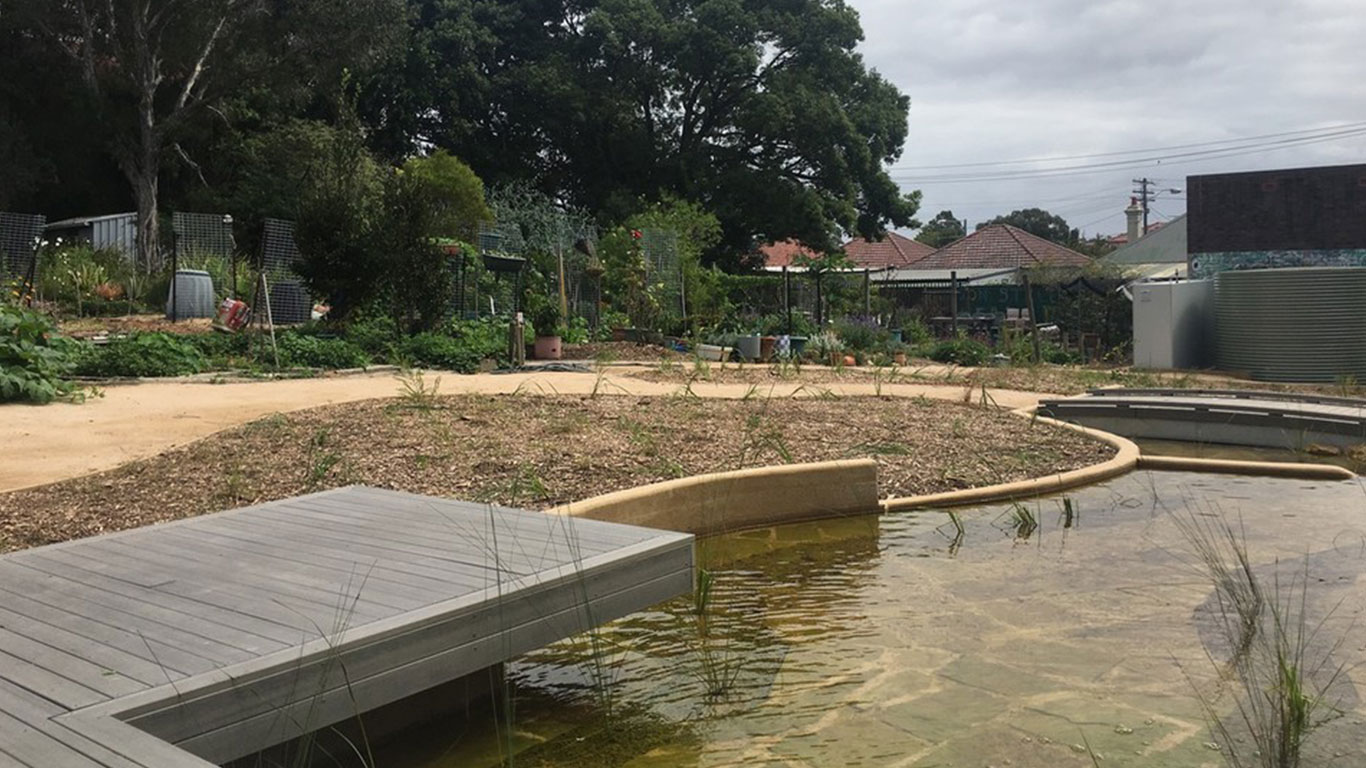Lessons on offer from real-life WSC projects
We’ve just published four new case studies offering deep insights, including the drivers, innovations and lessons, from four innovative water sensitive cities projects.
The case studies cover:
- Marrickville West Primary School eco water garden
- Green walls, roofs and facades in the City of Melbourne
- Victoria Planning Provisions Amendment (VC154 – Stormwater management)
- Water Sensitive Urban Design Voluntary Contribution Scheme for Moonee Valley City Council.

Marrickville West Primary School eco water garden
For this project, stakeholders used a co-governance model to create an ecowater garden at Marrickville West Primary School. This model helped overcome barriers to create a functional and dynamic community asset.
The works involved diverting water from a council drain into the grounds of Marrickville West Primary School, filtering it and then harvesting it to create a green space for the school and the local community.
The school uses the space as a play area and a teaching opportunity, and the Marrickville West Community Garden group uses the harvesting system to water an adjacent garden.
Lessons learnt
- Recognise that complex projects need people with a broad mix of skills.
- Engage with all stakeholders early.
- Understand the health risks of using harvested water in a school environment.
- Consider the maintenance arrangements at the beginning.
- Don’t underestimate the effort involved in realising complex projects.
Green walls, roofs and facades in the City of Melbourne
This project showed that local council leadership, and support for green infrastructure on private land, can help to achieve greening targets even when assets are privately, not city, owned. Collaborating and advocating can promote use of green infrastructure in high density urban areas. It’s particularly important to get buy in from developers and building owners in high density urban infill developments.
Since 2005, the City of Melbourne has initiated activities to encourage green infrastructure—such as green walls, roofs and facades—throughout the municipality. The project aims to create 10 hectares of green infrastructure by 2021, to support a prosperous, healthy, cool and liveable city.
Lessons learnt
- Use a champion to promote the work.
- Adopt a multidisciplinary approach.
- Allow for ongoing maintenance.
- Consider policy options.
Victoria Planning Provisions Amendment (VC154 – Stormwater management)
This statewide initiative strengthens stormwater management planning provisions for urban development and clarifies integrated water management planning policies.
On 26 October 2018, Amendment VC154 changed the Victoria Planning Provisions (VPP) and all planning schemes, to introduce new stormwater management provisions for urban development and amend State planning policies related to integrated water management (IWM).
This planning reform introduced stormwater management requirements for all commercial and industrial subdivisions and developments, all public use developments, and all residential multi-dwelling developments, and a new IWM policy into the Planning Policy Framework to embed IWM objectives and strategies in urban land use planning.
Lessons learnt
- Support regional areas.
- Understand and interpret the policy for each region.
- Review compliance.
Water Sensitive Urban Design Voluntary Contribution Scheme for Moonee Valley City Council
Voluntary contribution schemes can reduce compliance costs for developers and increase stormwater quality improvements. Local governments can learn from each other, and as a result achieve better stormwater treatment outcomes from new developments and deliver broader community benefits.
Moonee Valley City Council launched a Water Sensitive Urban Design (WSUD) voluntary contribution scheme (VCS) for planning applicants to help them meet their development’s onsite stormwater quality obligations from 1 July 2019. Applicants for new developments can choose to achieve 100% stormwater treatment compliance onsite or meet a minimum 80% treatment onsite and pay a financial contribution in lieu of the remaining portion of the requirements.
The council uses the money collected through the scheme to fund large-scale WSUD projects. The contribution scheme is generally applied to smaller and medium-density developments, although it is available to all developments (subject to council approval).
Lesson learnt
- Test the process.
- Contact developers early.
- Communicate the stormwater quality and quantity benefits.
- Consider community acceptance.
- Clarify council projects.